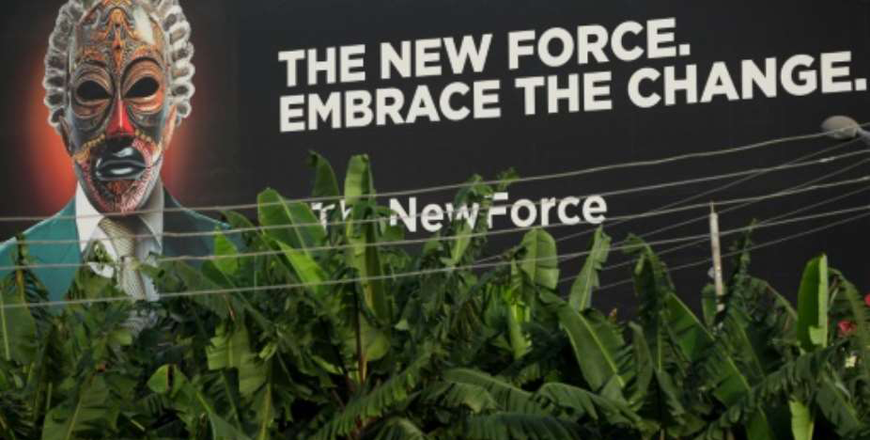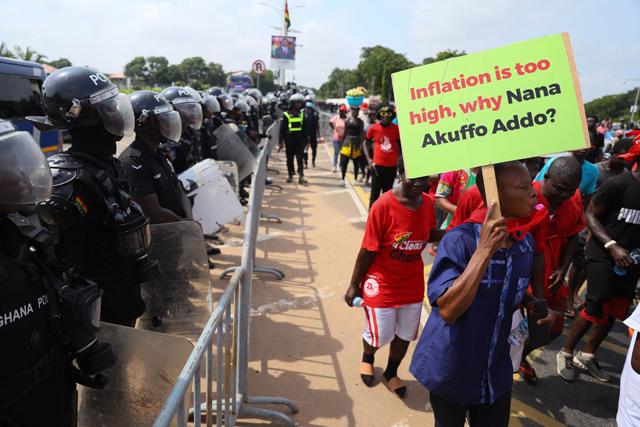You are here
Ghana’s masked third candidate tests two party politics
By AFP - Jan 22,2024 - Last updated at Jan 22,2024

Nana Kwame Bediako initially attracted attention with his masked billboard signs before revealing his identity as a presidential contender (AFP photo)
ACCRA — Eleven months ahead of Ghana’s presidential election, a new political force is emerging to challenge the long-standing two-party status quo.
With deft social media messaging, posters of his masked face and an appeal to younger voters, businessman Nana Kwame Bediako, popularly known as Cheddar, says his New Force movement will become a third political power.
Few analysts believe Bediako can truly test the ruling New Patriotic Party (NPP) and the opposition National Democratic Congress (NDC), which have dominated Ghana since 1992.
But already he appears to have shaken the mainstream establishment, as the country tries to emerge from its worst economic crisis in decades.
“I want to liberate the youth and empower them because our leaders have failed us,” Bediako told AFP by telephone.
“We cannot continue to be doing the same thing and getting it wrong all the time.”
In the December vote, Vice President Mahamudu Bawumia will represent the NPP, while former president John Mahama will be the NDC’s candidate.
Incumbent President Nana Akufo-Addo is stepping down after two terms.
Political Scientist Jonathan Otchere said he remained sceptical of the New Force’s ability to challenge the entrenched NPP and NDC.
“It’s invigorating to witness the emergence of fresh voices in today’s political landscape... there seems to be a demand for a new force,” Otchere told AFP.
“However, the question of whether Cheddar will truly make a significant impact is a separate matter altogether.”
Unmasking a new force
Bediako launched his campaign with scores of giant billboards featuring a man in a mask.
The inscription read: “Leadership for the next generation #thenewforce”.
He later revealed at a press conference that he was the man behind the enigmatic campaign.
A political convention aimed at gathering broad support was organised for earlier this month.
Bediako has already won backing from prominent foreign political figures, such as Peter Obi, who achieved popularity as a third candidate in last year’s Nigerian election, and Julius Malema, the charismatic leader of South Africa’s far-left Economic Freedom Fighters Party.
However, the event was halted after the military intervened, preventing attendees from accessing the Black Star Square venue in the capital Accra.
The Ghanaian president’s office later said the convention’s permit was revoked due to an unforeseen state event at the venue at the same time.
Still, Bediako remains determined to shake up the establishment.
“I am still going to run as an independent candidate in the December elections,” the property developer and self-styled philanthropist said.
A key question is how his foray into politics will resonate with young people, especially in a country with huge economic challenges.
Last year, Ghana entered into a $3 billion relief agreement with the International Monetary Fund amid its worst economic crisis in decades.
Unemployment stands at 13.7 per cent, while inflation is still in double digits.
“There is no hope for the youth. I want to be president because I want to help reduce the alarming unemployment situation of our country by teaching people how to raise capital and invest in their own businesses,” Bediako said.
Once a scrap dealer in London, he now runs the Kwarleyz Group whose activities cover real estate, construction and the hotel industry.
His New Force movement emphasises a departure from the old political ways and promises innovative solutions to economic challenges, though he has yet to present detailed plans.
“As a country, we shouldn’t be begging external financial institutions to build our economy. We’ve all the resources and we can be self-reliant,” he said.
Fresh perspective
Experts are divided on Bediako’s chances of victory, especially without the national structure of a political party.
Ghana’s five smaller parties generally account for less than 5 per cent of the vote in elections.
“Bediako brings a unique blend of business experience and a fresh perspective that could resonate with a significant portion of the electorate,” political analyst Annabel Asare said.
“The challenge lies in breaking the deeply rooted support for the established parties.”
Succeeding in Ghanaian politics requires not only popularity but also alliances, comprehensive policy proposals and a robust campaign infrastructure, analysts say.
But for some young people who are disappointed with the government, the New Force already appeals.
“We are tired of the NPP and NDC. There is no difference between them,” said Frank Odoom, 29, an unemployed graduate of the University of Ghana.
“I think Cheddar represents that new force we need.”
Related Articles
ACCRA — Ghanaian trader Mohammed Biney was already struggling when the government passed a new tax on electronic money transactions this yea
AMMAN — His Majesty King Abdullah on Thursday sent a cable to Ghana’s President Nana Akufo-Addo, congratulating him on the occasion of Ghana
AMMAN — His Majesty King Abdullah on Sunday sent a cable to Nana Akufo-Addo, congratulating him on assuming constitutional powers as Ghana’s
















